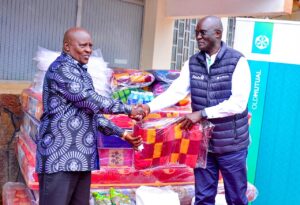Mercy Corps AgriFin Hosts its 6th Annual Learning Event

Over 400 participants from around the world gathered for Mercy Corps Agrifin's 6th Annual Learning Event to address how smallholder farmers and the wider food and agricultural system can leverage the power of digital to address some of the sector's traditional
and growing challenges facing smallholder farmers.
The event comes just a few days after the United Nations' COP27 Climate Conference, which called for urgent action to help smallholder farmers address the immediate and long-term implications of climate change, which is already having catastrophic effects in Africa and Asia, as evidenced by the current drought, the worst in the East African region in the last 40 years, which has left millions of people facing starvation and malnutrition.
Speaking at the 6 th Annual Learning Event, Mr. Sieka Gatabaki, Program Director, Mercy Corps AgriFin Kenya said, “The communities and countries that contribute the least to climate change are the ones hit first and hardest by its effects. These communities are currently experiencing fallout from the climate crisis today with drought and water crises, volatile weather, unstable food production and loss of livelihood. The climate change effects have been further compounded by the Russia-Ukraine crisis.
Fertilizer prices are at all time highs, more than double from a year ago, unfortunately coinciding as well with a hike in fuel prices, rising between 17-75% in the region. This will reduce the ability to grow sufficient food and efficiently, WFP estimates that production will decrease by 16% in 2022, increasing the number of food insecure in the region by 6-7 Million. Effects are being seen with FAO reporting that the global food price index increased by 12.6%, the highest levels since 1990.”
Since 2012, the Mercy Corp’s AgriFin program has been working with a wide range of market players in Africa and Asia to address market failures that exclude smallholder farmers, particularly women, from access to investment services, markets, and support needed to increase productivity, income, and
resilience in the face of the increasing risk of climate change. The program has so far reached over 16
million farmers with close to 40% of these being women.
Ms. Hannah Reed, Program Officer, Integration, Evidence and Learning- Agricultural Development at
Bill & Melinda Gates Foundation said, “Mercy Corps AgriFin, in partnership with Bill & Melinda Gates Foundation, have been running the AgriFin Digital Farmer (ADF) initiative that supports the expansion of high impact, digitally enabled services to millions of farmers across Kenya, Tanzania, Ethiopia, Uganda and Nigeria as focal markets, with possibility to expand projects to other SSA markets. Through the work and achievements of the ADF program, we have learned about how bundled digital farmer services can help improve lives of farmers; how to support an ecosystem of ag tech actors and how to design digital services specifically for women and other marginalized users.”
“With the pandemic we saw a rapid increase in usage of digital services; the question is whether we can bring similar energy and momentum to address the challenges the global food system faces due to
climate change and global conflicts. The situation is somewhat dire, with global undernourishment
having increased each year since 2016, reaching 768 million in 2021. “ Ms. Reed added.
AgriFin was created in 2012 with the aim of supporting farmer-facing organizations to harness the
promise of digital technology to expand critical services to smallholder farmers around the world.
The program is operational in nine countries namely Nigeria, Ethiopia, Kenya, Uganda, Tanzania, Zambia, Zimbabwe, India, and Indonesia. It has supported more than 8 million smallholders registered for bundles of services developed through the program and 150 partners. The program has also reached 16 million farmers with digitally- enabled COVID-19 and Desert Locust support.
The Mercy Corps AgriFin ALE is held annually to disseminate lessons learned throughout the year in the program, and influence ecosystem change according to the program’s theory of change. This year’s
event is themed ‘Developing Smallholder Farmer Resilience in the Face of Global Issues.’





